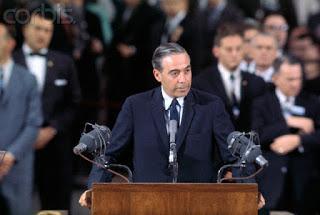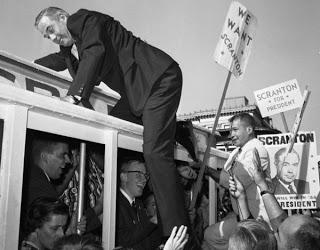William Scranton: Showdown in San Francisco
Part OneOn June 12th, 1964, William Scranton announced his candidacy in Baltimore, Maryland. Like the Republican Party itself, the audience was split. Half were moderates, relieved that Scranton had finally entered the fray. The other half were Goldwater fans, who interrupted his speech with chants of "We Want Barry!"
Scranton evoked the Federalist and Whig Parties, consigned to oblivion through internal divisions. "Can we pretend even to ourselves that it is possible for us to stand with one foot in the twentieth century and the other in the nineteenth?" Scranton asked, to a resounding "No!" Citing Goldwater's opposition to civil rights, he inveighed against abandoning the GOP "to a philosophy of negation. This is a philosophy of progression!"
Moderates quickly fell in line. Rockefeller exited the race on June 15th, offering Scranton his campaign staff. Henry Cabot Lodge made an even grander gesture, resigning his Ambassadorship to join Scranton's campaign and pledging his delegates. Pennsylvania Senator Hugh Scott formed a Congressmen for Scranton Committee, fearing a Goldwater victory would swamp Republican Congressmen.
All but Eisenhower, who still refused to endorse Scranton. So Scranton turned to Thomas Dewey, former New York Governor and Republican candidate in 1944 and 1948. Dewey put his Wall Street and RNC contacts at Scranton's proposal, but achieved little. "It was as if the Goldwater people had rewired the switchboard of the Party," one complained, unable to rouse the Party into action.
"The Republican establishment is desperate to defeat me," Goldwater concluded, but it seemed a lost cause. Since 1960, strategist F. Clifton White built an impressive national apparatus, snaring state delegations and grassroots groups for Goldwater long before the first primary. Scranton's belated, scattershot efforts couldn't compete. Whether through pique or forlorn hope, Rockefeller refused to release his own delegates to Scranton.
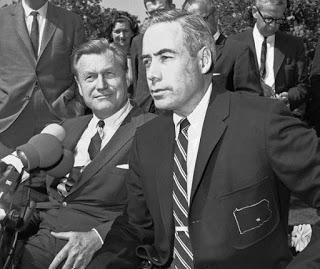
Rockefeller and Scranton campaigning
Scranton hoped to barnstorm the country, rousing popular support and peeling delegates away from Goldwater. Polls showed Scranton running closer against Lyndon Johnson than Goldwater, polling better nationally among Republicans. Johnson himself feared Scranton, calling him "a character assassin [who] does it in Brooks Brothers style." He remembered Richardson Dilman, and so did the press.An invigorated Scranton hit the stump. With his wife Mary and teenaged children, he appeared in Meadville, Pennsylvania, Des Moines, Topeka, Minneapolis, St. Louis, Denver, Louisville, Boston and Harrisburg within a week. He shook hands with crowds, gave forceful speeches, showed uncharacteristic energy. He appeared on Face the Nation and Meet the Press, no longer vacillating but assured and forceful.
"Send to the White House a man who thinks deeply, who is not impulsive," Scranton urged Republicans. In contrast to Goldwater's "reactionary" views, Scranton defined his platform as "reasoned conservatism... responsible conservatism," which would "take the best there is of the past, and then apply those principles to the problems of today."
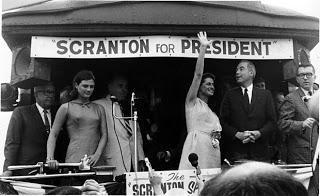
Scranton with his wife Mary and daughter Susan (far left) in Decatur, Illinois
At first, it worked. Enthusiastic crowds met him everywhere: invigorated old-time Republicans, young activists chanting "We want Scranton!" Students for Scranton chapters and the moderate Ripon Society provided volunteers; establishment donors, much-needed funds. Thirty thousand letters and telegrams flooded his campaign offices. Press coverage was positive: the Washington Post claimed that Scranton was "calling the GOP from the land of make-believe."Less commendably, Scranton turned to rough tactics. He assailed Goldwater as a reckless madman, "wreaking chaos and uproar" through his platform. "The Republican Party wonders how it will make clear... that it does not oppose Social Security, the United Nations, human rights and a sane nuclear policy," he warned. He complained that Goldwater "made our party sound naïve, irresponsible, reactionary and heartless."
Goldwater fumed. Bill Scranton had been his friend, and the insults hurt. "The Republican establishment is desperate to defeat me," he said. "They can't stand having someone they can control." Journalists, too, tired of Scranton's verbal stilettos; the Cincinnati Enquirer attacked him as "faceless... gutless... devoid of a good sense of history and judgment."
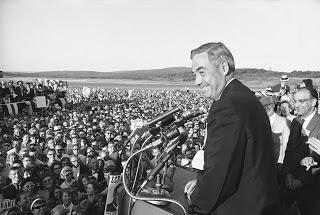
Scranton on the campaign trail
Behind the scenes, things weren't so rosy. Scranton's staff was poorly organized, unprepared for a national campaign. The influx of Rockefeller staffers hurt, rather than helped; Rockefeller aides George Hinman and Jack Wells bullied Bill Keisling and Walter Alessandroni, trying to dictate strategy and speeches. But Scranton's biggest failure came in securing delegates.Illinois was key to Scranton's ambitions. The state had 58 delegates, 40 in Goldwater's pocket. Scranton nonetheless banked on Illinois's leading Republicans, gubernatorial candidate Charles Percy and Senator Everett Dirksen, both moderates who disliked Goldwater. Scranton overestimated their pull, underestimated the years of groundwork prepared by Cliff White and his agents.
Scranton arrived in Chicago on June 30th, his arrival picketed by Goldwater supporters and, strangely, civil rights activists. He decamped at O'Hare Inn, finding Goldwater and Minnesota Senator Harold Stassen, perennial candidate, already present. The delegates listened to all three candidates, then rendered their verdict: 48 delegates for Goldwater, 10 abstensions, 0 for Scranton. The Pennsylvanian struck out.
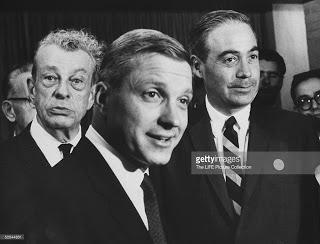
Scranton with Everett Dirksen (left) and Charles Percy (source)
Even so, Scranton pressed onward. He received ovations in Atlanta as he called for a post-racial South. He headed west, scouring California, Oregon, Utah and Washington for votes. Supporters cheered him like a rock star; delegates were already pledged to Goldwater. Not everyone was so friendly: in Harrisburg, someone slapped a Goldwater bumper sticker on Scranton's car. During a swing through Kankakee, Illinois, conservatives egged his train.Scranton struggled to maintain his balance. He made another swing through the Midwest without success; a trip to North Carolina yielded big crowds and no votes. He attended the North Dakota State Fair in early July, riding a hot air balloon. "It runs on hot air, just like my campaign!" he joked.
Even humor couldn't save Scranton. When the votes were tallied, his month-long campaign only peeled two delegates away from Goldwater, leaving him barely 200. Goldwater already exceeded the 655 needed for the nomination; with favorite sons releasing their delegates, his number threatened to swell. As Republicans converged on San Francisco, only a miracle could stop Goldwater now.
Fun in San Francisco
Scranton arrived in San Francisco on July 8th. He bolted aboard a trolley, ate corn and barbecue, shook hands and joked with supporters. This last-minute schmoozing made good press, but didn't convince anyone. A month's campaigning had achieved very little, and Scranton knew it. No longer was he the GOP's savior: comedian Dick Gregory compared him to "the guy who runs to John Wayne for help."If Scranton stood any chance before, no longer. Ohio Governor James Rhodes released his delegates on July 9th; they flocked to Goldwater. Wisconsin soon followed. San Francisco swarmed with tens of thousands of Goldwater supporters, eager to see conservatism's triumph. One historian called San Francisco "the conservative Woodstock," a primal memory for conservatives everywhere. Both for their triumph, and the bitterness it engendered.
Scranton added only a handful of votes to his total, mostly Lodge delegates, Puerto Rico and the Virgin Islands. Eleventh hour appeals to Dirksen and Rhodes achieved nothing. His greatest triumph came with Florida; through forceful argument, he pried a single delegate from Goldwater. With Rockefeller clinging to his delegates, dreams of an upset vanished.
Next came platform battles. Scranton's supporters insisted upon a moderate civil rights plank, a denunciation of the John Birch Society. Goldwater's staffers refused. Wisconsin Congressman Melvin Laird, the Convention chairman, sided with Goldwater. At this point, neither side cared to compromise.
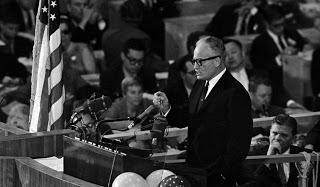
Goldwater's acceptance speech
Scranton's staffers Keisling and Alessandroni undertook one last, desperate act. Drawing on an interview Goldwater gave to the German magazine Der Spiegel, advocating tactical nuclear weapons, they typed a letter on July 12th, once again airing Goldwater's extremism. It was bitter, venomous and wholly defiant:Goldwaterism has come to stand for nuclear irresponsibility... Goldwaterism has come to stand for being afraid to forthrightly condemn right-wing extremists. Goldwaterism has come to stand for law and order in maintaining racial peace. In short, Goldwaterism has come to stand for a whole crazy-quilt collection of absurd and dangerous positions that would be soundly repudiated by the American people in November.
The letter infuriated Goldwater. "I consider it an insult to every Republican in San Francisco," he fumed. He sent the letter back without comment, distributing copies to other Republicans. Scranton disavowed its contents while taking responsibility; in reality, it wasn't worse than anything he'd said on the campaign trail.
Balloting at the Cow Palace on June 13th was a foregone conclusion. Goldwater won on the first ballot with 883 votes; Scranton, a distant second with 214; Rockefeller, stubbornly clinging to 114.
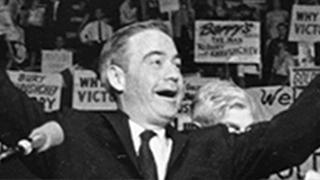
Scranton calls for unity
Scranton moved to make Goldwater's nomination unanimous. "Let it be clearly understood that this great Republican party is our historic home," he told supporters:We have no intention of deserting it. We are still Republicans - and not very still ones, either. And let the Democratic Party find no comfort in the spirited campaign we have just waged within our party.
Stirring words, but too late. Afterwards, Rockefeller denounced extremists and received boos; Goldwater championed "Extremism in the defense of liberty" and nominated Congressman William Miller as his running mate. Rockefeller and Romney refused to campaign for Goldwater; Scranton proved an exception, joining his old friend on the stump. It mattered little: a divided GOP stood no chance against the Johnson juggernaut.
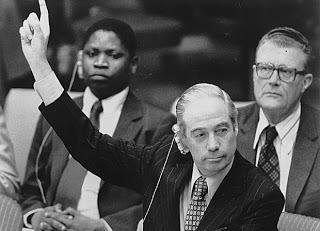
Later life: Scranton as UN Ambassador, 1976
Scranton returned to Pennsylvania, finishing his term in 1967. He refused to run for the Senate and to serve in Richard Nixon's cabinet. He did chair the Committee on Campus Unrest, investigating the Kent State shootings of 1970; setting Wage and Price Controls for Richard Nixon; serving as Gerald Ford's UN Ambassador and a labor advisor to Jimmy Carter. But he refused calls for elective office until his death in July 2013.Could the moderates have won in 1964? The terrible Ifs accumulate: if Scranton had joined earlier; if Rockefeller hadn't remarried; if Lodge had run more seriously, or not at all; if Nixon or Romney entered the fray. The plethora of Ifs provides the answer: the moderates didn't have a champion, a strategy or a platform. Conservatives had all three.
Historians and pundits treat Rockefeller and Scranton's efforts as the last stand of principled men, moderates standing athwart the reactionary tide. Yet their very intransigence burned deep scars into the conservative psyche. In subsequent decades, conservative Republicans acted to purge their party of liberals and moderates. One can blame the dogma of ideological purity; but the self-serving intransigence of moderates in San Francisco played its part.
Bill Scranton was a good man and an honorable statesman. He made a terrible presidential candidate. Theodore White commented that Scranton "lacks... appetite for power, appetite for command" and it showed in his ambivalent, quixotic campaigning. With his defeat, the Republican Party began its march towards conservatism.
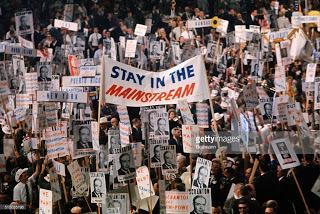 Sources and Further Reading
Sources and Further ReadingBiographical information comes from George D. Wolf, William Warren Scranton: Pennsylvania Statesman (1981). The only full-length biography of Scranton, it was written by Scranton's friend and gubernatorial aide. The 2004 PBS documentary William Warren Scranton: In a Clear Light includes interviews with Scranton, his family and colleagues.
For the 1964 campaign, see: Robert David Johnson, All the Way With LBJ (2009); Robert Novak, The Agony of the GOP, 1964 (1965); Rick Perlstein, Before the Storm (2001); and Theodore White, The Making of the President, 1964 (1965). Johnson also has an extremely useful website featuring LBJ tapes pertaining to the election.
As before, Perlstein and Geoffrey Kabaservice, Rule and Ruin (2012) do the best job of placing Scranton within the GOP's evolution.
